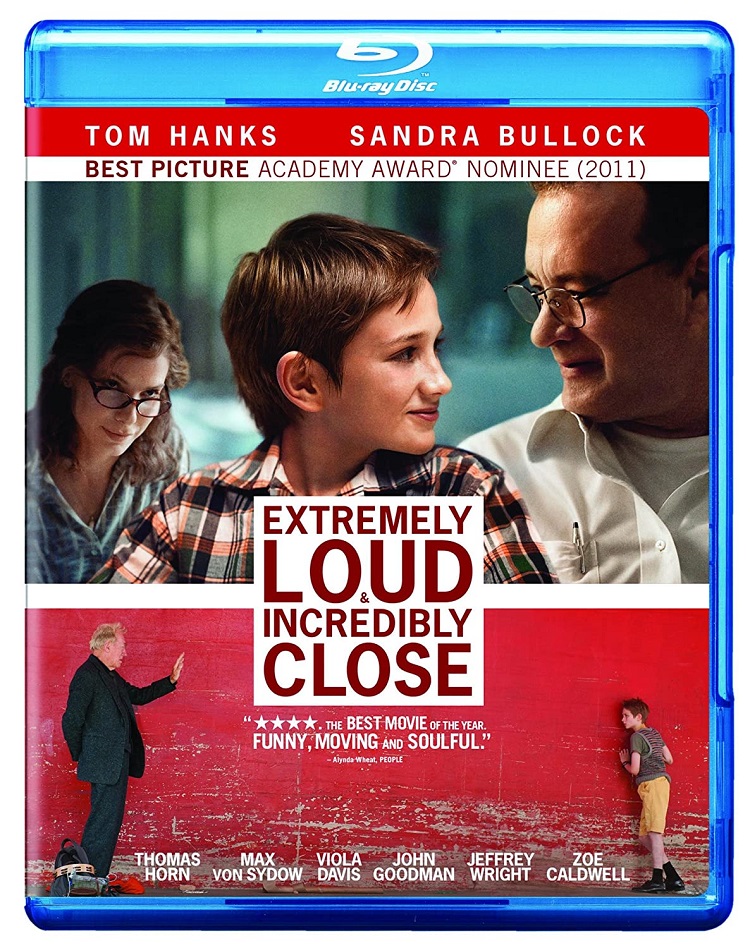
The Film
I’m not sure if it’s the nauseating amount of precious quirk or the hammering lack of subtlety that’s to blame for the agony that is Extremely Loud & Incredibly Close, 2011’s black sheep of the Best Picture contest. Taken on their own, either one would probably be enough to torpedo the most well-intentioned of movies; combined together here, they’re an unstoppable force of shamelessness.
With a script by Eric Roth based on Jonathan Safran Foer’s 2005 novel of the same name (not terribly well-received, but it’s hard to imagine it’s worse than the film), Extremely Loud & Incredibly Close tells the story of Oskar (Thomas Horn), a pre-adolescent bundle of precocious tics whose father (Tom Hanks) perished in one of the World Trade Center towers on 9/11. Oskar is desperate to retain any connection to his dad, and the discovery of a mysterious key in an envelope labeled “Black” sets him off an expedition around New York City that mirrors the ones his father would arrange for him while he was alive.
Convinced of the key’s importance, Oskar makes a list of every person with the surname Black in the five boroughs, and then treks across the city on foot (his aversion to public transportation is one of his more bearable idiosyncrasies) to ask each one about the key. Along the way, he receives some guidance from a mute acquaintance (Max von Sydow) who communicates via pad and pen and “yes” and “no” written on his hands.
It’s a testament to von Sydow’s supreme gift that he lends an air of gravitas to this silliness. Unfortunately, Horn, a first-time actor here, has little hope of achieving the same. He’s actually not bad and nearly gives a performance that could be classified as “unmannered” if it weren’t for the fact that Oskar is lacquered in mannerisms and any authentic human behavior suffocated by contrivances.
What’s worse is the overly sentimental Daldry touch, which reaches new heights here. Scenes where Oskar spars with his grieving mother (Sandra Bullock, barely present) are bad enough, but flashbacks to the events of what Oskar calls “the worst day” are brazen in their attempts to wring tears out of our collective memories of that tragedy. Any possible catharsis a story like this could’ve achieved is smothered by Daldry’s heavy hand, aided by a cloying Alexandre Desplat score that doesn’t so much prod as shove.
The Blu-ray Disc
Presented in 1080p high definition with an aspect ratio of 2.40:1, the Blu-ray transfer of the film is excellent. Fine detail is readily apparent in the film’s somewhat muted color palette and doesn’t waver in moments of shadow or low light. Excessive digital manipulation is nowhere to be seen.
The 5.1 DTS-HD Master Audio track is nicely immersive, with New York City streets offering plenty of opportunity for ambient sound. Dialogue is clean and clear in the fronts, while Desplat’s score batters and bruises with impeccable clarity.
Special Features
Three of the extras are pretty standard studio stuff, including a making-of with much of the principal cast and crew, a featurette on Horn’s ascension from Jeopardy! Kids Week contestant to actor and a piece on the incorporation of a real 9/11 victim’s photo into the film. Not so expected is nearly 45 minutes of outtake footage surrounding von Sydow’s performance. Slowly paced and minimally edited, this lacks the ephemeral slickness of most studio EPKs and allows one to watch von Sydow — easily the best part of the whole film — work.
The package also includes a DVD of the film and a code to download an Ultraviolet digital copy from Warners.
The Bottom Line
If you don’t mind being shamelessly manipulated, Extremely Loud & Incredibly Close might work for you, but I found the experience nearly unbearable.
Extremely Loud & Incredibly Close available on Blu-ray Combo pack, DVD and for download now.